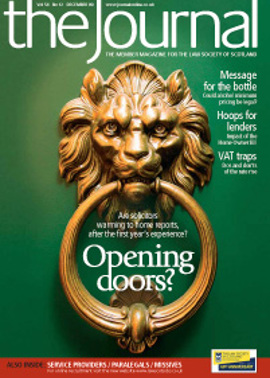The very definition of paralegal

One clue is in the title, as what it means to be a paralegal has never truly been defined in Scotland. The pace of change over the last few years demands that we now identify and create a structure for an estimated 10,000 people working in this capacity in the Scottish legal profession.
Between May and July last year, in partnership with the Scottish Paralegal Association (SPA), the Society held a preliminary consultation on the creation of a regulated status for paralegals in Scotland, and the concept of the “registered paralegal”.
The consultation, which attracted over 400 responses, closed during the economic decline and, while no launch date was confirmed, analysis of the responses and crucial development on a potential framework for the scheme continued through 2009. By bringing the project under the management of the Education and Training Policy Department, which was on the cusp of delivering an unprecedented change programme regarding a new route to qualification and CPD regime from September 2011, there emerged a fresh opportunity to develop a final set of policy proposals for registered paralegals in line with overarching policy thinking on standards for trainee solicitors and CPD.
So why consult again? We are operating in a markedly different market to that of summer 2008, and we know that recovery may take some years. In the interim, redundant paralegals may have embarked on further study to improve their employability in anticipation of market recovery. Certainly, organisations delivering legal services have required to re-evaluate their business models and their positioning within the Scottish legal services market generally, to ensure their sustainability.
A commitment from the Society to launch the registered paralegal scheme, in what remain challenging times, is therefore meaningful. The consultation on the policy paper outlining the framework of the scheme, which reflects the market we are now in whilst holding to the principle that regulation of paralegals is essential, runs from 30 November 2009 to 28 January 2010. It can be accessed at www.lawscot.org.uk/ paralegals, or contact registeredparalegals@lawscot.org.uk for further information.
The proposed launch in spring/ summer 2010 will be a definitive step for the Scottish solicitor and paralegal professions. Please take the time to share your views.
Collette Paterson is Deputy Director (Education and Training Policy) at the Law Society of Scotland
WHAT THE SCHEME INVOLVES
How will someone become a registered paralegal?
Transitional arrangements have been developed which ensure fair access for those who already meet the standard, in recognition of those with qualifications and those without certain qualifications, but with relevant experience. Otherwise, all entrants will:
- provide evidence of their “relevant qualification”, and details of a supervising solicitor;
- enter as a “trainee registered paralegal” and work towards agreed standards during a one year training period;
- qualify as a registered paralegal with the agreement of the supervising solicitor after a year’s training period;
- continue working under a supervising solicitor and adhere to a code of conduct, CPD regime, and be subject to sanctions for non-compliance, or in the event of a complaint naming them which is upheld.
Which areas of practice are covered?
The Society has developed a set of base competencies which apply regardless of practice area. In addition, each applicant to the scheme and their supervising solicitor will complete a questionnaire which draws out the specific skills, knowledge, attitudes and values which apply to their practice area. To assist applicants with their understanding of this process, questionnaires have been completed for six “guide areas” – conveyancing, civil litigation, wills and executries, criminal litigation, debt recovery, and liquor licensing.
What are the benefits to paralegals?
A robust set of entry criteria will apply to the scheme. Through that, and a code of conduct and CPD regime, a professional status and defined career path for paralegals will emerge. It is envisaged that higher grades of registered paralegal, and fast-track routes into the scheme, will be developed in a later phase. The Education and Training Policy team also proposes to incorporate the role of registered paralegal in future reviews of routes into the profession of solicitor, and fast-tracking which may be possible for registered paralegals, particularly where demand for traineeships may continue to exceed supply. There will also be associated benefits of membership.
What are the benefits to supervising solicitors?
Whilst solicitors will retain overall responsibility for the work undertaken, they will be able to rely on the competence of a registered paralegal not only before they offer employment, but also in the course of individual transactions. Standards of competence and a code of conduct will be clearly articulated, as will the sanctions which can be imposed on a registered paralegal who falls short of the standard, or has a complaint upheld against them through the scheme.
Is this the best option for paralegals and solicitors?
Paralegal associations, the SPA and Society of Specialist Paralegals to name two, do often impose standards on their members in Scotland. The Society believes that regulation is the next step, and that integrating paralegal regulation and representation within its existing functions, is the most efficient and cost effective way forward.
Who covers the cost of the scheme?
Other than the initial outlays made to bring the scheme to fruition, the scheme is intended to be self-funding, and not funded through the practising certificate fee. It will be for those benefiting from it – registered paralegals, supervising solicitors and businesses employing both – to decide on payment of an annual £100 fee per registered paralegal.
Comment from the SPA
The Scottish Paralegal Association was formed in 1993 in response to the growth of the paralegal profession in Scotland. In the early days it was a challenge simply to obtain recognition of an additional tier which was neither legal secretary nor solicitor.
Traditionally paralegals rose from the ranks of skilled legal secretaries. Today we also see paralegals entering the profession direct from college and university or transferring from other industries. As a result, paralegals in Scotland today work in a range of legal arenas from the traditional high street practice to in-house commercial concerns, government and financial institutions. You will find paralegals selling and purchasing your dream home, drafting wills or dealing with the estate of a loved one, settling disputes with your neighbour, or processing your remortgage.
The SPA believes not only that paralegals should be promoted and gain the recognition they deserve, but that standards are an absolute necessity to our integrity and respect as an emerging profession. Standards to us mean firmly established membership criteria, a code of conduct, a grading structure, in-office experience and the requirement to maintain CPD. Given the increasing use of paralegals in both the public and private sectors we believe that it is in the best interests of paralegals, clients and employers as a whole that the person undertaking the provision of legal services ought to meet certain criteria and be regulated to ensure that the criteria are met.
The Legal Services Bill has made proposals which will change the face of legal services in this country. It is not unrealistic to expect, in some areas at least, the emergence of services where there is one supervising solicitor to many paralegals. It is therefore all the more important that the person who is dealing with a transaction is regulated as competent, able and fit to do so.
Delays as a result of the economic downturn have been unavoidable, but we are delighted to see our work with the Society, in developing the “Law Society of Scotland Registered Paralegal” scheme, proceeding with the final consultation. This is an opportunity to add your voice and views to the proposed scheme. It is important that we receive as many responses as possible from all interested parties to ensure that this scheme is fit for purpose and delivers what you expect.
Karen Leslie and Alison Butters are practising paralegals and Joint Presidents of the Scottish Paralegal Association
In this issue
- Home reports have devastated the Scottish house market
- Review of the Fatal Accident Inquiry Legislation
- The Gill Review: a personal injury practitioner’s perspective
- A tale for our times
- A step too far?
- Report card
- Down the slipway
- Homing instinct
- Bottle for a contest
- Ready for the VAT rise?
- New website to promote training openings
- First solicitor advocates approved as "senior"
- Your feedback
- The very definition of paralegal
- Law reform update
- Lawyers can network too
- Ask Ash
- Welcome, user! (and you're sued)
- Communication, communication, communication
- Keeping the peace
- On the mark?
- Crown disclosure: the next level
- Tackling improvements
- Camera angles
- Cutting red tape in Europe
- Scottish Solicitors' Discipline Tribunal
- Website review
- Book reviews
- Calling the shots
- Sector "rising to challenge": Millar
- "One size" is a dodgy fit
- BSA brings in standard instructions
- A new burden is born






